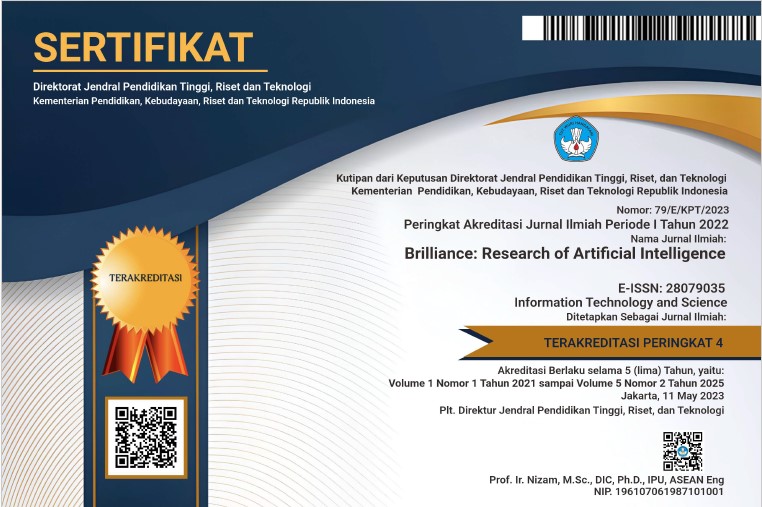Asynchronous Wind Turbine Generator: Output Power Evaluation
DOI:
10.47709/brilliance.v1i2.1565Keywords:
Wind energy, Output power, Wind speed, Wind Turbine, Asynchronous generatorDimension Badge Record
Abstract
In addition to photovoltaic (PV) power plants, wind turbine generators represent the most ubiquitous renewable energy use today. The stochastic and intermittent character of wind as a key source of electricity is one of the fundamental challenges associated with wind turbines WT. This paper describes an induction generator used in wind turbines. The implemented Turbine utilizes a straightforward output power against wind speed relationship to convert wind speed to turbine output power. When the wind speed is below or above the cut-in speed, the turbine produces no real power. Constantly, the machine consumes reactive power. This implemented block compensates for the machine's reactive power demand. Local load consumption is 75 kW. The electricity grid makes up for any shortage in wind turbine generation. When the generator's output exceeds 75 kW, the excess energy is exported to the grid.
Abstract viewed = 194 times
References
"World wind capacity at 650, 8 GW, Corona crisis will slow down markets in 2020, renewables to be core of economic stimulus programmes" (Press release). WWEA. 16 April 2020. Retrieved 1 September 2021. Wind power capacity worldwide reaches 650, 8 GW, 59, 7 GW added in 2019.
Evans, Annette; Strezov, Vladimir; Evans, Tim (June 2009). "Assessment of sustainability indicators for renewable energy technologies". Renewable and Sustainable Energy Reviews. 13 (5): 1082–1088. doi:10.1016/j.rser.2008.03.008.
Yu.N. Petrenko, S.A. Stankevich, Development of a Control Algorithm that Provides the Highest Possible Power output of Wind Turbine with Energy Storage, Electronics, Automation and Measuring Technology. (2011) 47–52.
V.S. Krivtsov, A.M. Oleynikov, A.I. Yakovlev, Inexhaustible energy. Bk. 1. Wind turbine, KhAI Publ., Kharkiv, 2003.
Information on http://cdn.intechweb.org/pdfs/16255.pdf.
E.V. Solomin, I.M. Kirpichnikova, A.S. Martianov, The Iterative Approach to the Design and Optimization of Vertical Axis Wind Turbines, Proc. of the VII Int. Scientific Conference of Young Scientists "Electrical. Electrotechnology. Energy". (2015) 92–95.
S.V. Kozlov, A.N. Kudryashov, E.V. Solomin, An Analysis of the Effectiveness of Energy Storage Systems, International Scientific Journal "Alternative Energy and Ecology". 6(170) (2015) 10–23.
The MathWorks: SimPowerSystems for Use with Simulink, User’s Guide Version 4.
Hui Li; Shi, K.L.; McLaren, P.G.: Neural-network-based sensorless maximum wind energy capture with compensated power coefficient, IEEE Transactions on Industry Applications, Vol. 41, issue 6, pp.1548–1556, 2005.
A. A. Ahmed and O. S. M. Jomah, "Vehicle Yaw Rate Control For Lane Change Maneuver Using Fuzzy PID Controller And Neural Network Controller," 2020 IEEE 2nd International Conference on Electronics, Control, Optimization and Computer Science (ICECOCS), 2020, pp. 1-6, doi: 10.1109/ICECOCS50124.2020.9314541.
A. A. Ahmed, J. Santhosh and F. W. Aldbea, "Vehicle Dynamics Modeling and Simulation with Control Using Single Track Model," 2020 IEEE International Women in Engineering (WIE) Conference on Electrical and Computer Engineering (WIECON-ECE), 2020, pp. 1-4, doi: 10.1109/WIECON-ECE52138.2020.9397983.
Mohamed Mohamed Khaleel, Mohd Rafi Adzman, Samila Mat Zali, Mustafa Mohamed Graisa, and Abdussalam Ali Ahmed, "A Review of Fuel Cell to Distribution Network Interface Using D-FACTS: Technical Challenges and Interconnection Trends," International Journal of Electrical and Electronic Engineering & Telecommunications, Vol. 10, No. 5, pp. 319-332, September 2021. Doi: 10.18178/ijeetc.10.5.319-332
T. Boutsika and S. Santoso, "Quantifying the effect of wind turbine size and technology on wind power variability," 2013 IEEE Power & Energy Society General Meeting, 2013, pp. 1-5, doi: 10.1109/PESMG.2013.6672587.
S. Z. Farooqui, "Autonomous wind turbines with Doubly-Fed Induction Generators," 2009 3rd International Conference on Energy and Environment (ICEE), 2009, pp. 62-70, doi: 10.1109/ICEENVIRON.2009.5398667.
H. A. Mohammadpour, Y. Shin and E. Santi, "SSR analysis of a DFIG-based wind farm interfaced with a gate-controlled series capacitor," 2014 IEEE Applied Power Electronics Conference and Exposition - APEC 2014, 2014, pp. 3110-3117, doi: 10.1109/APEC.2014.6803749.
I.S. Naser, Mohamed Alsharif, Adel Hamad Rafa, and Abdussalam Ali Ahmed, Impact of Wind Farm Location on Voltage Stability, SEBHA UNIVERSITY Journal of Pure & Applied Sciences Vol.20 No. 4 2021, Doi: 10.51984/JOPAS.V20I4.1820.
Abdussalam Ali Ahmed, Renewable Energy Home Design in Bani Walid City/Libya, Saudi J Eng Technol, Sep 2019; 4(9): 339-344
Downloads
ARTICLE Published HISTORY
How to Cite
Issue
Section
License
Copyright (c) 2021 Nasr Ismael Alhusein

This work is licensed under a Creative Commons Attribution-NonCommercial 4.0 International License.


















